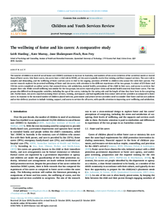Displaying 571 - 580 of 2163
The current research explores the perceived wellbeing of foster and kin carers, with attention to the different experiences of the two groups.
In this chapter from the book Education in Out-of-Home Care the authors highlight ongoing legislative and policy challenges related to postsecondary education for care leavers.
This chapter from the book Education in Out-of-Home Care presents findings from a study of the educational progress of Out of Home Care (OHC) children in England.
The present research from the book Education in Out-of-Home Care examined the question of possible gender effects of a tutoring program for children in foster care in Ontario, Canada, as well as several other questions of a practice-related nature, including the impact of implementation fidelity on the effectiveness of the tutoring program and the children’s and caregivers’ perception of the tutoring.
This chapter from Education in Out-of-Home Care describes part of a project in England where the concept of Caring Schools was developed, with four domains: ethos and leadership, child focused practice, relationships with parents and carers, and interagency working.
This chapter from the book Education in Out-of-Home Care reviews available evidence, drawing on a recent small-scale English research study to explore the potential of early education as an intervention for children in care.
This chapter from the book Education in Out-of-Home Care outlines the skills that are necessary for a successful start to formal schooling for children placed into out-of-home care (OHC).
This chapter from the book Education in Out-of-Home Care reviews the available research on issues related to early childhood education and care (ECEC) for children in foster care in Australia and reports findings on the ECEC experiences of 60 children aged 3 to 5 years from the Australian Early Childhood in Foster and Kinship Care study.
This book draws together for the first time some of the most important international policy practice and research relating to education in out-of-home care.
This chapter from the book Education in Out-of-Home Care examines how far education and the school context meet the educational needs of out-of-home care children in Hong Kong from the perspective of inclusive education.

